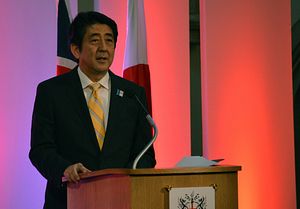On August 6, just as Japan mourned the lives lost in Hiroshima in the world’s first atomic bombing and reaffirmed its commitment to a nuclear-free world, the Advisory Panel on the History of the 20th Century and on Japan’s Role and World Order in the 21st Century submitted its report to Prime Minister Shinzo Abe. Commonly referred to as “Kitaoka Commission,” after its deputy chairman Shinichi Kitaoka, the Commission’s considerations and recommendations are said to play a critical role as Abe finalizes his highly anticipated statement to commemorate the 70th anniversary of the end of World War II.
The Commission consists of 16 members. Some of the members, including Kitaoka, who is president of the International University of Japan, are academics. Others are former government officials, non-governmental organization representatives, and journalists. All were selected with the blessing of Abe himself. In particular, Kitaoka, who also chaired another commission that deliberated on the right of collective self-defense-related issues, has been known to have Abe’s confidence.
At the outset, Abe tasked this Commission with deliberating on five issues: (1) What are the “lessons learned” we need to take away from the history of the 20th century?; (2) how should we evaluate postwar history of Japan?; (3) how has Japan tried to achieve reconciliation with its former enemies, including the United States, Australia, the countries in Europe, China, South Korea and the rest of Asia?; (4) based on the lessons learned from the 20th century, what kind of vision should Japan pursue for Asia and for the world in the 21st century?; and (5) what are the specific principles with which Japan should formulate its policies at this juncture?
The report itself is not terribly long—the Japanese original is 38 pages long, its English translation 41 pages long. However, the report deserves to be acknowledged for a couple of reasons.
First, the report unambiguously refers to Japan’s behavior before and during World War II—especially in Asia—as “aggression.” While it does note dissenting opinions by some commission members and the reasons for their dissent, in a footnote of the final report, the report argues that Japan went against the key trends in the post-World War I international order—self-determination, democratization, delegitimization of war, and economic development—and inflicted grave damage in Asia. Furthermore, the Commission’s report urges that Japan should continue its dialogue with China and South Korea toward reconciliation, and it should always work with Southeast Asian countries with humility.
Secondly, the report reaffirms three critical lessons that Japan learned from World War II. Those lessons were: (1) international conflicts must be resolved peacefully; (2) democracy needs to be promoted; and (3) free trade must be supported. Indeed, these are the principles on which Japan has based its post-World War II foreign policy. These are also the principles that are reaffirmed in Japan’s National Security Strategy as the guiding principles of Japan’s foreign and security policy.
Finally, the report presents four guiding principles for the vision for Japan’s future—deepen the understanding of history, support the existing international order, contribute to peace and development, and make Japan more open to changes and interaction with outside forces. In particular, the first principle—deepen the understanding of history—is noteworthy, as the specific recommendations the report made under this category have elements of both remembering prewar Japan and reflecting on the lives of Japanese that were lost during the war.
It has been reported that Abe’s 70th anniversary statement will be an official, Cabinet-approved document. As concern surges that Abe may not say “the right things” in his 70th anniversary statement, the Kitaoka Commission’s report stands as a powerful narrative that reflects the consensus of the majority (if a silent one) of Japanese—something which Abe knows he will have to respect.
































